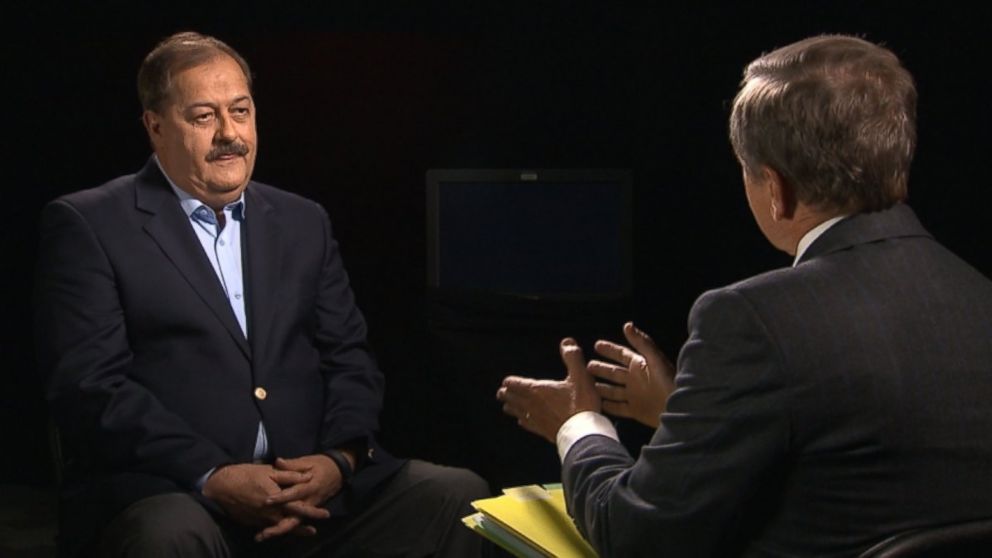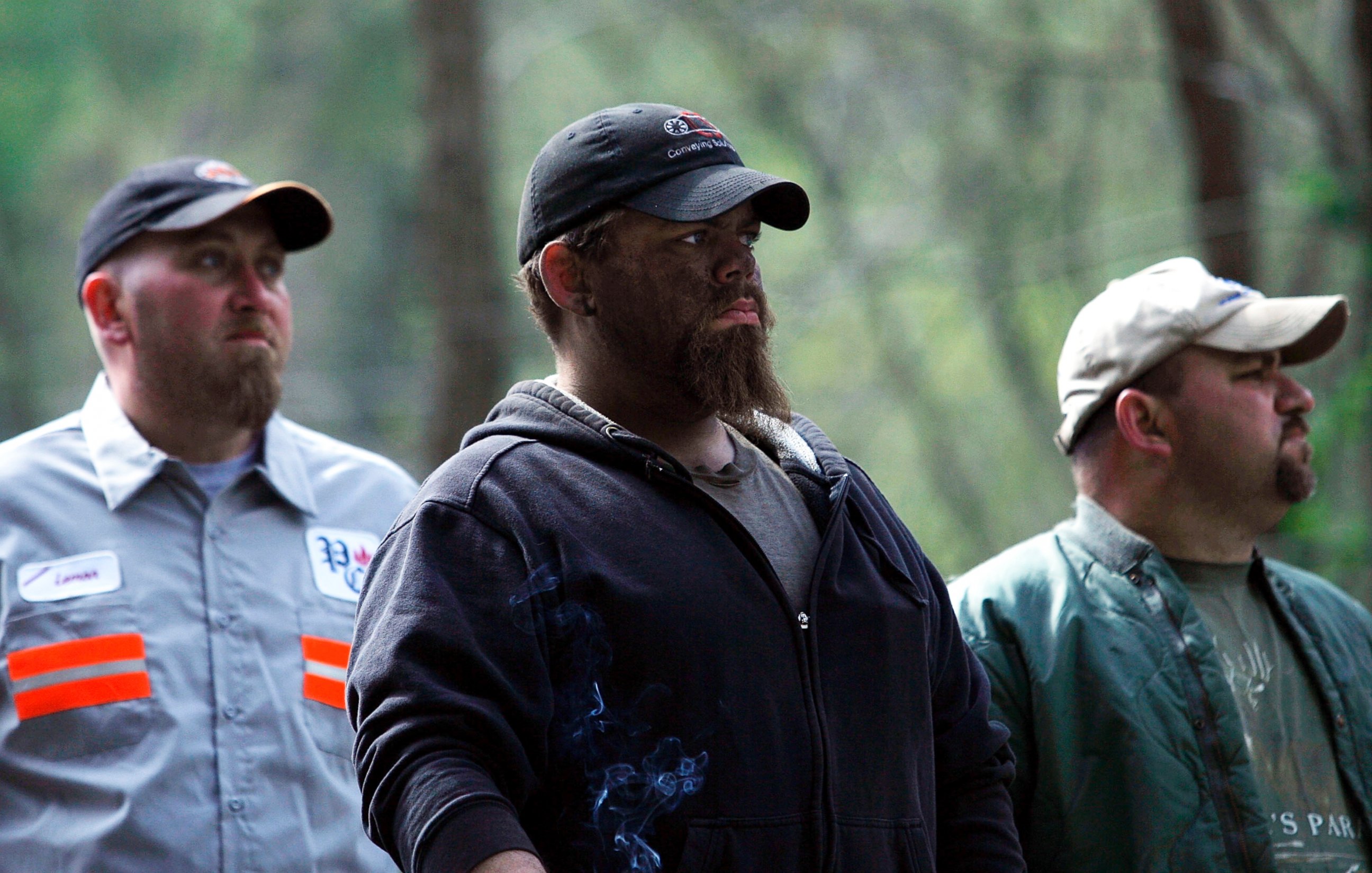The Downfall of Coal King Don Blankenship
Don Blankenship, former CEO of Massey Energy, indicted on conspiracy, fraud.
— -- Coal king Don Blankenship, the once larger-than-life figure in Appalachia whose strong-fisted leadership of a giant coal conglomerate made him both famous and feared, finally met the fate that the families of those who died in his mine had so long hoped for: indictment on federal charges of conspiracy, fraud and making false statements.
A federal grand jury returned the indictment against Blankenship, the former CEO of Massey Energy, late Thursday alleging that after an explosion at the Upper Big Branch mine in April 2010 took the lives of 29 coal workers, Blankenship made false statements about safety practices to the Securities and Exchange Commission.
Additionally, the indictment alleges that for years prior to the explosion, Blankenship “conspired to commit and cause routine, willful violations of mandatory federal mine safety and health standards” at the mine and “was part of a conspiracy to impede and hinder federal mine safety officials from carrying out their duties at Upper Big Branch by providing advance warning of federal mine safety inspection activities, so their underground operations could conceal and cover up safety violations that they routinely committed.”

Blankenship's attorney, William W. Taylor III, said in a statement that Blankenship "is entirely innocent of these charges. He will fight them and he will be acquitted."
"Don Blankenship has been a tireless advocate for mine safety," the statement said, according to The Associated Press. "His outspoken criticism of powerful bureaucrats has earned this indictment. He will not yield to their effort to silence him. He will not be intimidated."
The indictment came just months after Blankenship sat down with ABC News in April and said he was despised because he “does the right thing,” denying that he ever cut corners on safety matters. When asked if he believed he would be indicted, Blankenship chuckled and said, “No.”
Shortly before the interview, a federal safety report on the Upper Big Branch disaster had concluded, “If basic safety measures had been in place... there would have been no loss of life at UBB [the Upper Big Branch mine].”
In April Sen. Joe Machin, D-West Virginia, told ABC News, “I believe that Don has blood on his hands and I believe that justice will be done. I’ve got to believe that.”

The indictment is the latest twist in the steep rise and sharp fall of Blankenship, who for years has had controversy following him as he raked in millions at the helm of his coal empire. Well before the tragic events at Upper Big Branch, Blankenship was the central figure in allegations of improper influence he is said to have had with the West Virginia Supreme Court.
Part of the controversy stemmed from Blankenship’s efforts to elect Justice Brent Benjamin to the West Virginia Supreme Court at a time when Massey had a $50 million verdict coming before the court. Blankenship’s campaign to elect Benjamin was so extensive the United States Supreme Court determined that the judge should have recused himself from the case. Blankenship had donated almost $3 million to a campaign committee called “And For The Sake Of The Kids,” which ran ads for Benjamin, and other supporting groups.
When asked if he believed he would be indicted, Blankenship chuckled and said, “No.”
The alleged efforts to influence Benjamin represented only part of the problem cited by Blankenship’s critics. There was also his close friendship with Justice Elliot E. "Spike" Maynard, who was also part of the court’s 2007 majority to reverse a $50 million verdict against Massey. In 2008, ABC News reported on the friendship, turning up photographs of the two men vacationing together in the French Riviera. Maynard later recused himself from further proceedings after the controversy arose.
In the midst of the scandal, one member of the state supreme court, Justice Larry Starcher, argued that “Blankenship’s bestowal of his personal wealth, political tactics, and ‘friendship’ have created a cancer in the affairs of this Court.”
When ABC News originally approached Blankenship in 2008 to ask questions about these personal and financial relationships, he grabbed a producer’s camera and told him he was “liable to get shot.”

The 2010 explosion at Upper Big Branch may have cost Blankenship control of his company – Massey was ultimately bought by Alpha Natural Resources in 2011, six months after Blankenship stepped down as CEO.
In April of this year, as federal officials began to focus on his role in the Upper Big Branch explosion after he refused to participate in the official state and federal investigations, Blankenship embarked on a public relations offensive to promote a 50-minute film called “Never Again” which offered what he said was proof that the explosion was the result of an unexpected surge of natural gas into the mine shaft – not the result of safety deficiencies.
“No one ever did more for improving or trying to improve safety,” Blankenship told ABC News. He said he declined to meet with investigators because he did not believe they would treat him fairly.
Families of the miners killed in the disaster told ABC News they thought the film shameless self-promotion and that Blankenship was lying.
Four other Massey employees have already been prosecuted, but many families of the victims have long criticized the slow pace of the criminal probe into Blankenship and have held rallies demanding justice.
Blankenship could face a maximum combined penalty of 31 years behind bars if convicted, according to the Department of Justice.



